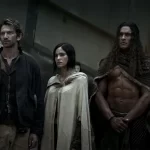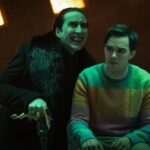If Only It Were The Last, by Tyler Smith
The official trailer for Star Wars: The Last Jedi has arrived and there is a lot of fanfare about it, understandably so. I don’t consider myself much of a Star Wars fan, and even I felt a surge of excitement when I saw Mark Hamill’s intensity as an older – and, it would appear, angrier – Luke Skywalker. There is something kind of invigorating about the film’s choice to undercut the obvious. I’m sure many of us were expecting Luke to be a kindly, wise old man, not unlike Alec Guiness’ Obi Wan Kenobi. That the character is instead seen as a potential source of instability make The Last Jedi a much more original entry in the series, unlike The Force Awakens, whose job it was to counteract the bad will generated by the prequels and, in the process, gave the audience almost exclusively what it both wanted and expected.
It’s also nice to see that the new film will be paying off what The Force Awakens so effectively set up (possibly at the expense of a satisfying story of its own). Rey (Daisy Ridley), such a delightfully curious character in the first film, is going to discover her own mystical potential, and Kylo Ren (Adam Driver) appears to be continuing his war on everything that once made him a human being. Finn (John Boyega) confronts his past as a pawn for the First Order. And it would seem that we will finally be given a bit more information on the mysterious (though admittedly not remarkably intriguing) Supreme Leader Snoke (Andy Serkis). Yes, the film truly does look like it will be exciting, dark, and engaging.
This would all mean more to me, however, if Disney had committed to simply making a new trilogy and nothing else (at least for a little while). We have been taught that Star Wars films come in threes, and if Disney had shown some restraint, opting to finish this trilogy before releasing Rogue One or the upcoming Han Solo movie, all of these operatic storylines and images would seem so much more impactful. As it is, though, there is – and will be, for the foreseeable future – a new Star Wars movie every year. Just like the Marvel Cinematic Universe, the Justice League films, and even the Fast and Furious series.
By committing to squeezing every drop of box office out of the Star Wars brand, Disney has turned it into just another tentpole franchise. This might not seem like that big of a deal, but I feel that to do so actually robs the individual films of some of their power. The Last Jedi looks action-packed, but also deeply tragic. It confirms what The Force Awakens suggested: that the end of the Empire did not solve all of the galaxy’s problems, and that evil has a way of continuing in some form or another, often as a response to the past. The nature of this new trilogy – particularly the instability of Kylo Ren – suggests that there is no true “happily ever after”, and that good must always keep fighting, even to keep itself from being perverted.
This is pretty powerful stuff, but a little less so when we are constantly checking in on this universe. Pop culture has already robbed Star Wars of a lot of its iconographic power; now Disney, with its desire to inundate us with new Star Wars content, is actually cheapening the storylines themselves through overexposure.
Will The Last Jedi be good? Based on the trailer, I think so. It seems to be taking some chances and really toying with a fatalism that you don’t expect from this series. But that sense of inevitable finality would carry more weight if we weren’t invited by the studio back into this world year after year after year after year. Another Disney property – er, I mean, uh, character – recently said, “A thing isn’t beautiful because it lasts.” I agree with that sentiment, and I also think it extends to success. A constant stream of money isn’t the only barometer of achievement; there are a lot of ways to measure success. And, when it comes to art, restraint is a virtue; it came make us value the work that is there, on the page, on the canvas, on the screen. But it seems that this is not a virtue that Disney is interested in cultivating, and the individual films will suffer as a result.































I completely agree. Sometimes I think the worst part about this constant franchise/Cinematic Universe movie world we now live in is that none of them are allowed to end. It’s happening now with TV where people are just bringing back old favorites that were supposed to be over (probably more to do with laziness/fear of taking any kind of risk). I get slightly sad about the end of my favorite things like everyone else, but I am so happy now whenever something is allowed to have an Ending. It makes it so much better to END definitively with no trace of “to be continued?” It’s just exhausting, this constant churning out of “story.” Good stories have endings, they’re supposed to – and no one will let these stories end! GAH.
You make some good points, but the most recent film I saw in a theater is Blade Runner 2049, so I can’t be too down on revivals as a concept (Fury Road is another really good one).
Yeah, revivals can be good (anything can be good) but Fury Road was great, and great as a stand alone addition rather than the start of a new series of movies (I hope that isn’t happening). And 2049 would be more moving to me if I knew that last image was The Last, but there was that dangling thread of a “war coming” that makes it like they really want to make this a series now. Don’t know if it will happen now, but I would rather not have diminishing returns.
I found Rogue One much more interesting than the New Hope retread which preceded it. So it’s only those standalone films you complain about which get my hopes up now.
It’s not the films themselves that bother me so much as the general timing. There’s just too much too often. To me, it falls under the idea of “How can I miss you if you never leave?”
I was actually encouraged by a couple of actors (Mark Hammel for one) saying that they were shocked – and a little disturbed – at the direction the Johnson took the story, and the portrayal of Luke is one of them.
I did find Force Awakens to be both the best and worst of JJ Abrahams, and modern moviemaking, in general. It had a solid, eventful script and thrilling action pieces, but there was an undercurrent of either pandering/rehash (Looking at you, Starkiller Base) flippant miss-use, (There you are, Phasem), or seeming very intentional mysteries (Rey’s parentage) The movie lacked breathing room for pacing (The whole bumping into Han Solo 5 min off the planet. How easy was that?) I wanted the thoughtfulness.
You know, I finally watched Jaws for the first time all the way through, and I caught the scene with Roy Schider and his little boy at the kitchen table. Roy is exhausted and puts his head in his hands, and the kid does the same thing. The wordless scene progresses – we get a sweet bonding moment, realize the stakes, and gently slide into the next great sequence with Richard Dryfess. Its graceful, wonderful – Breathing space.
I need to care about these people. When Luke fussed about going to Toshie Station and not cleaning the droids, when he worried about what his Uncle would say – and when he stood over his chared-corpses – it had gravity. I only got one moment of that in The Force Awakens. There could have been several. Big action movies need to be human again.